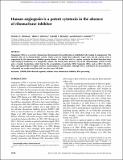Human angiogenin is a potent cytotoxin in the absence of ribonuclease inhibitor
Author(s)
Thomas, Sydney P; Hoang, Trish T; Ressler, Valerie T; Raines, Ronald T
DownloadPublished version (3.429Mb)
Terms of use
Metadata
Show full item recordAbstract
© 2018 Steiman-Shimony et al. Angiogenin (ANG) is a secretory ribonuclease that promotes the proliferation of endothelial cells, leading to angiogenesis. This function relies on its ribonucleolytic activity, which is low for simple RNA substrates. Upon entry into the cytosol, ANG is sequestered by the ribonuclease inhibitor protein (RNH1). We find that ANG is a potent cytotoxin for RNH1-knockout HeLa cells, belying its inefficiency as a nonspecific catalyst. The toxicity does, however, rely on the ribonucleolytic activity of ANG and a cytosolic localization, which lead to the accumulation of particular tRNA fragments (tRFs), such as tRF-5 Gly-GCC. These up-regulated tRFs are highly cytotoxic at physiological concentrations. Although ANG is well-known for its promotion of cell growth, our results reveal that ANG can also cause cell death.
Date issued
2018Department
Massachusetts Institute of Technology. Department of ChemistryJournal
RNA
Publisher
Cold Spring Harbor Laboratory